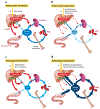Hepcidin and Iron in Health and Disease
- PMID: 35905974
- PMCID: PMC9943683
- DOI: 10.1146/annurev-med-043021-032816
Hepcidin and Iron in Health and Disease
Abstract
Hepcidin, the iron-regulatory hormone, determines plasma iron concentrations and total body iron content. Hepcidin, secreted by hepatocytes, functions by controlling the activity of the cellular iron exporter ferroportin, which delivers iron to plasma from intestinal iron absorption and from iron stores. Hepcidin concentration in plasma is increased by iron loading and inflammation and is suppressed by erythropoietic stimulation and during pregnancy. Hepcidin deficiency causes iron overload in hemochromatosis and anemias with ineffective erythropoiesis. Hepcidin excess causes iron-restrictive anemias including anemia of inflammation. The development of hepcidin diagnostics and therapeutic agonists and antagonists should improve the treatment of iron disorders.
Keywords: anemia; hepcidin; inflammation; iron; iron overload.
Figures


References
-
- Pasricha SR, Tye-Din J, Muckenthaler MU, Swinkels DW 2021. Iron deficiency. Lancet 397:233–48 - PubMed
-
- Park CH, Valore EV, Waring AJ, Ganz T. 2001. Hepcidin, a urinary antimicrobial peptide synthesized in the liver. J. Biol. Chem 276:7806–10 - PubMed
-
- Ganz T, Nemeth E. 2011. Hepcidin and disorders of iron metabolism. Annu. Rev. Med 62:347–60 - PubMed

